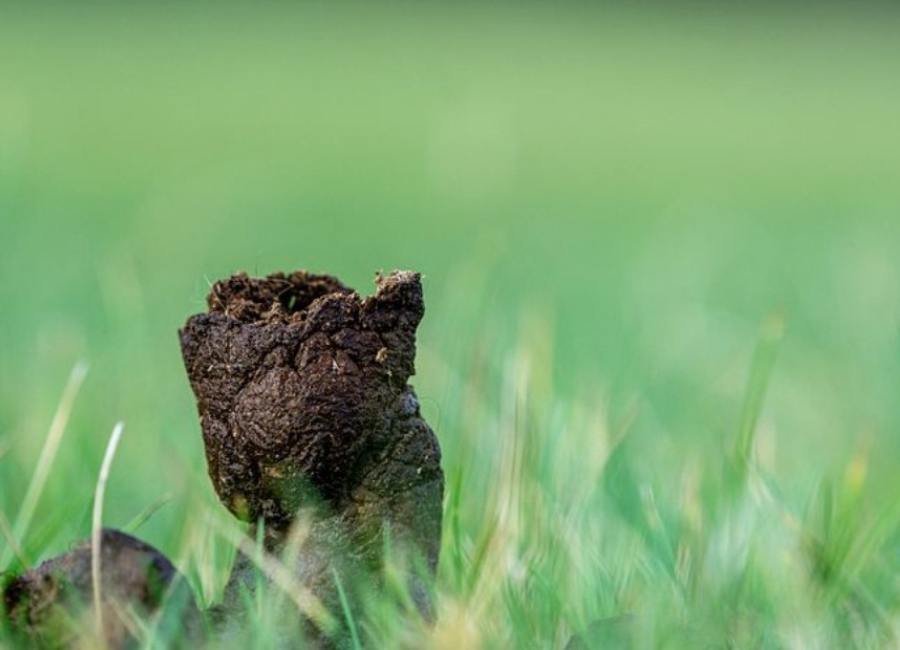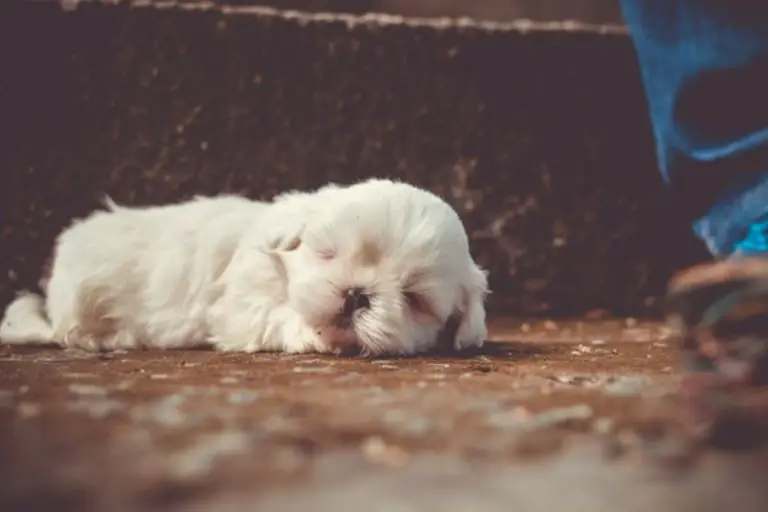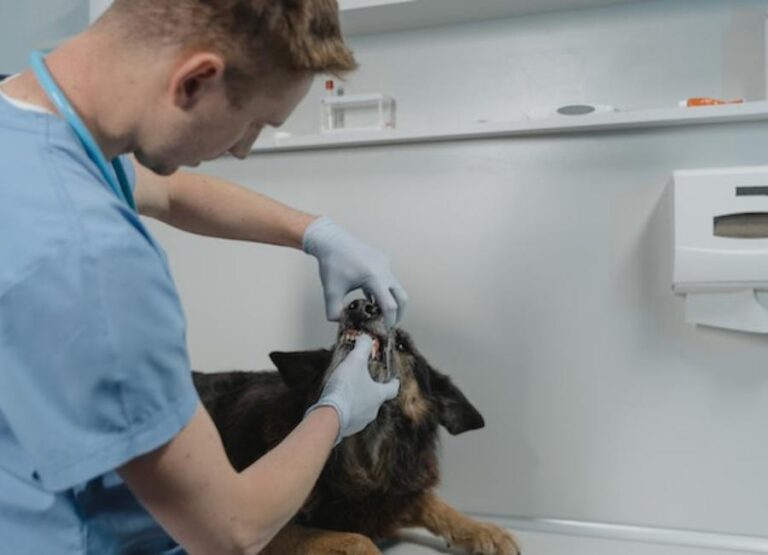9 Potential Reasons Your Dog Poop Is Dry And Crumbly

Let’s talk about a not-so-glamorous yet essential topic: dog poop is dry and crumbly. Ever noticed that sometimes it’s dry and crumbly?
Well, grab your scooper and join me on a quick exploration into the world of canine bowel movements. Trust me, it’s not as gross as it sounds!
Dog Poop Is Dry And Crumbly
Dry and crumbly dog poop can be caused by dehydration, insufficient fiber in the diet, or a medical issue. Ensure your dog stays hydrated by providing ample water.
Introduce more fiber-rich foods like vegetables or consider a specialized dog food. If the issue persists, consult your vet to rule out any underlying health concerns.
Regular monitoring of your dog’s diet and water intake can help maintain healthy bowel movements.
What Healthy Dog Poop Looks Like
Healthy dog poop should be firm but not too hard, moist, and easy to pick up. It should be a chocolate brown color and have a mild odor.
If the poop is consistently different from these characteristics, it may indicate a health issue and a veterinarian should be consulted.
Remember to monitor your dog’s poop regularly as changes in its appearance or consistency can be an early indicator of health problems.
Let’s dive deeper…
Potential Reasons Your Dog Poop Is Dry And Crumbly
The following are some of the potential reasons your dog poop is dry and crumbly:
1. Dehydration
Dehydration can have a significant impact on the consistency of your dog’s poop.
When your pup doesn’t get enough water, their body will try to absorb as much moisture as possible from their food, leaving their stool dry and hard.
Factors such as hot weather, increased activity, or not having constant access to fresh water can contribute to dehydration.
It’s essential to ensure your dog has access to clean, fresh water at all times, especially during warm weather or after physical activity.
If you suspect dehydration, encourage your dog to drink more water and consider consulting your vet for additional guidance.
2. Constipation
Just like humans, dogs can experience constipation, which can lead to dry, crumbly stool.
Constipation occurs when your dog has difficulty passing stool, often due to factors such as lack of exercise, certain medications, stress, or dietary issues.
If you notice that your dog is straining to defecate or not producing stool as frequently as usual, it’s important to consult your vet.
They can provide guidance on how to alleviate constipation and ensure your dog’s digestive system stays healthy.
3. Lack of Fiber in a Dog’s Diet
Fiber plays a crucial role in maintaining healthy digestion for dogs. A diet lacking in fiber can result in dry, hard stool.
Certain commercial dog foods may not contain adequate levels of fiber, especially if they are primarily composed of highly processed ingredients.
Adding fiber-rich foods to your dog’s diet, such as certain vegetables and fruits, can help regulate their digestion.
However, it’s important to consult your vet before making any significant dietary changes to ensure that they are appropriate for your dog’s specific needs.
4. Dietary Issues
The quality and composition of your dog’s diet play a crucial role in their digestive health. If your dog’s food lacks sufficient fiber, it can lead to dry and crumbly stool.
Fiber is essential for maintaining healthy bowel movements, so ensuring that your dog’s diet includes an appropriate amount of fiber from sources like vegetables, fruits, and grains is important.
Additionally, inadequate water intake can also contribute to dry stool.
Dogs need access to fresh, clean water at all times to support proper digestion. If your dog’s food and water intake aren’t balanced, it can result in dry and crumbly poop.
5. Side Effects of Medications
Certain medications can impact your dog’s gastrointestinal system, leading to changes in stool consistency.
For example, antibiotics and pain medications are known to affect the digestive tract and can potentially cause dry, crumbly stool as a side effect.
If your dog has recently started a new medication and you’ve noticed changes in their stool, it’s advisable to consult your veterinarian.
They can provide guidance on whether the medication is the likely cause and suggest any necessary adjustments.
6. Health Conditions
Several health conditions can contribute to dry and crumbly dog poop. Dehydration is a common culprit, as insufficient water intake can lead to a lack of moisture in the stool.
Gastrointestinal issues such as inflammatory bowel disease (IBD), parasites, or other digestive disorders can also affect stool consistency.
If your dog’s dry and crumbly stool persists, it’s crucial to seek veterinary attention to rule out any underlying health concerns and receive the appropriate diagnosis.
7. Change in Diet
A sudden change in your dog’s diet can lead to digestive issues, including dry and crumbly poop.
Dogs have sensitive stomachs, and abrupt changes in food can disrupt their digestive system.
For example, if you’ve switched your dog to a new food with lower moisture content, it could result in firmer stools.
To avoid this, it’s best to transition your dog to a new diet gradually over the course of about a week by mixing small amounts of the new food with the old food.
8. Food Allergies
Food allergies in dogs can manifest in various ways, including dry and crumbly poop.
If your dog is sensitive to certain ingredients in their food, it can lead to gastrointestinal issues. Common allergens for dogs include beef, chicken, dairy, wheat, and soy.
If you suspect food allergies, your vet may recommend an elimination diet to identify the problematic ingredients.
Look out for other symptoms of food allergies such as itching, redness, ear infections, and digestive problems.
9. Parasites
Parasites such as worms and protozoa can wreak havoc on your dog’s digestive system, leading to irregular bowel movements, including dry and crumbly poop.
Parasites can sap essential nutrients from your dog’s body and cause gastrointestinal distress.
Regular deworming and preventative measures, such as using flea and tick preventatives, can help protect your dog from parasitic infections.
If you suspect parasites, a visit to the vet for a fecal examination can help identify and treat any underlying issues.
Learn more about worms in dog poop.
What to Do If Your Dog Has Dry and Crumbly Poop
If your dog’s poop is dry and crumbly, there could be a few reasons for it.
First, make sure your dog is drinking enough water, as dehydration can cause dry poop.
Check your dog’s diet – if there’s been a sudden change, it might be causing the issue.
Next, take a look at their diet – maybe they need more fiber or a change in their food.
Consider adding some moisture-rich foods like wet dog food or cooked vegetables to their meals.
It’s also important to rule out any underlying health issues, so a visit to the vet may be necessary.
Keep an eye on your dog’s poop consistency and make adjustments as needed.
Remember, a healthy diet and plenty of water are key to your furry friend’s digestive health!
Learn more about dog poop looking like mucus.
Frequently Asked Questions
Why is my dog’s poop dry and crumbly?
Dry and crumbly dog poop can be a sign of dehydration. When a dog doesn’t have enough water in their system, their body absorbs more water from their stools, resulting in dry and crumbly poop. It’s essential to ensure your furry friend stays hydrated to maintain healthy bowel movements.
What can I do to prevent my dog’s poop from becoming dry and crumbly?
To prevent dry and crumbly poop, make sure your dog has access to fresh water at all times. Encourage them to drink by providing clean bowls of water in multiple locations. If you notice your dog isn’t drinking enough, try adding a bit of low-sodium chicken broth to their water to entice them.
Are there any dietary factors that contribute to dry and crumbly dog poop?
Yes, diet plays a significant role in a dog’s stool consistency. A lack of dietary fiber can lead to dry and crumbly poop. Ensure your dog’s diet includes enough fiber, which can be found in vegetables, fruits, and quality dog food. Consult with your veterinarian to determine the right amount of fiber for your dog’s specific needs.
Can certain medical conditions cause dry and crumbly poop in dogs?
Yes, certain medical conditions can contribute to dry and crumbly dog poop. Intestinal parasites, gastrointestinal infections, or conditions like inflammatory bowel disease can affect the moisture content of the stool. If you suspect a medical issue, it’s crucial to consult with your veterinarian for a proper diagnosis and treatment plan.
Is it normal for a dog’s poop to be dry and crumbly occasionally?
Occasional dry and crumbly poop may not be a cause for concern, especially if your dog is otherwise healthy and not showing any other symptoms. Factors such as changes in diet, stress, or weather conditions can temporarily affect the consistency of their poop. However, if the issue persists or is accompanied by other symptoms, it’s best to consult a veterinarian.
How can I monitor my dog’s poop to ensure their overall health?
Monitoring your dog’s poop is an essential part of their overall health assessment. Apart from consistency, be observant of color, odor, and any unusual signs such as blood or mucus. Regularly checking their poop can help detect potential health issues early on and allow you to seek veterinary advice if needed. Remember to always consult with a veterinarian if you have any concerns about your dog’s poop or general well-being.
Conclusion
In conclusion, dealing with dry and crumbly dog poop can be a frustrating experience for pet owners.
However, with proper hydration, a balanced diet, and regular exercise, you can help your furry friend maintain healthy and well-formed bowel movements.
Remember, a happy dog means less stress and cleaner walks for everyone involved.


![Dog Traumatized After Boarding [Full Explanation] Dog Traumatized After Boarding](https://petcreeks.com/wp-content/uploads/2023/04/Dog-Traumatized-After-Boarding-768x555.jpg)



